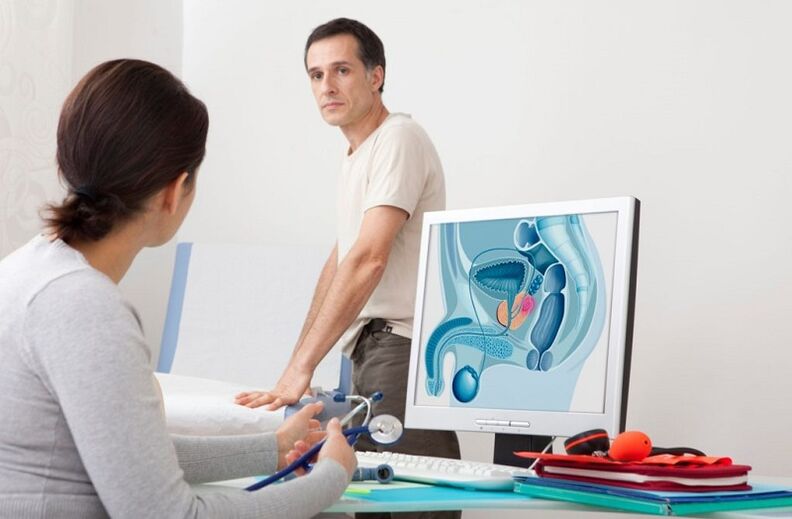Acute prostatitis is an infectious and inflammatory disease that covers the prostate tissue, causing widespread swelling and the appearance of purulent foci. The disease can manifest in different ways, depending on its stage of development. Therefore, a comprehensive method is needed to accurately diagnose. The treatment of acute prostatitis is usually based on medication and physical therapy techniques.
the reason

Alcohol can cause acute prostatitis.
The disease most commonly occurs in men over 30 years of age. In most cases, the development of the disease is due to the negative impact of the pathogenic microbiota on the male body. Therefore, male acute prostatitis can be caused by the activities of the following microorganisms:
- Staphylococcus aureus;
- Pseudomonas aeruginosa and Escherichia coli;
- Klebsiella;
- Enterococcus;
- Proteus.
Most of the above-mentioned microorganisms continue to exist in the human body, and no inflammation is observed. If these bacteria enter the prostate tissue, their active reproduction process begins, resulting in severe inflammation in the prostate.
During unprotected sex, bacteria may infiltrate the genitourinary system. Therefore, it is very important for people who do not have a regular sexual partner to use condoms.
Inflammation may also be non-infectious, and its development reasons are as follows:
- obesity;
- A sedentary lifestyle;
- Rare sexual intercourse;
- Hypothermia;
- Intercourse interrupted;
- Eating disorders;
- Smoking and alcoholism.
The above factors create fertile ground for stagnation of prostate secretion. At the same time, stagnant blood processes are found in blood vessels located near the organs.
With the accumulation of a large amount of prostate secretions, a favorable environment is created for the reproduction of pathogenic bacteria. As a result, the development of the inflammatory process occurs. The latter can cause many complications, such as:
- Prostatic hyperplasia;
- Abscess;
- Oncology process.
important!In the context of acute prostatitis, most men will have problems with sexual function and are at risk of infertility.
Therefore, in the risk group for developing this disease are people like this:
- Irregular sex life;
- Lack of physical activity;
- Have bad habits.
Form and stage

If you have symptoms of prostate discomfort, you should go to the hospital immediately.
In modern medicine, this disease is mainly divided into three stages. Let us consider them in more detail:
- The first stage is called catarrhal.It is characterized by the occurrence of a primary inflammatory process, glandular tissue edema, and acinar dilation. In this case, the size of the prostate will increase. If the disease is not treated, the inflammation will gradually pass to the excretory duct of the prostate that is connected to the back of the urethra. As the prostate ducts become inflamed, they will gradually narrow and block, so the secretion process of prostate secretions is somewhat difficult. In the catarrhal stage of its development, the inflammatory process only covers the mucus layer.
- Next is the follicular phase of the disease.It is characterized by the further progression of the inflammatory process, in which the remaining tissues of the organ are gradually affected. As a result, an acute form of bacterial prostatitis appeared. In the analysis of urine at this stage of the disease development, pus is present. However, despite the damage to a large number of tissues, prostatitis in the follicular form responds well to treatment.
- The last stage is called substance.It is characterized by destructive changes in prostate tissue. At the same time, the swelling gradually expands, and the inflammatory process eventually covers the entire organ. If the disease progresses to this stage, then the treatment process is very complicated and fundamental measures need to be taken. If there is no timely and adequate treatment, chronic prostatitis may develop.
In the initial stage of the development of the disease, the subacute stage is usually distinguished. It is characterized by a weaker severity of symptoms, which can be explained by the low activity of the pathogen. If the patient's body resistance is good, the disease can be at this stage for a long time. At the same time, the diagnosis of subacute disease is very difficult, which is why most patients do not receive timely treatment.
symptom
Each form of this disease has its own symptoms. Therefore, you should consider them separately.
Catarrhal form

This form of disease is characterized by frequent and very little walking.
If the infection has reached the excretory duct, then this stage of the disease will develop. However, although the inflammatory process does not extend beyond the mucosa, the prostate will enlarge and swell. In this case, the urethra is squeezed.
The symptoms of acute prostatitis at this stage are mild:
- The patient may notice minor problems with urination due to pressure on the pipe;
- At night, the urge to urinate becomes more frequent;
- Body temperature may rise to 38 degrees;
- When the patient is in a sitting position, he may feel a little heavy in the perineum.
In some cases, the catarrh form occurs without severe hyperthermia.
The symptoms of this disease can go away on their own after a few weeks of development. In this case, most patients will not see a doctor. However, this is full of the transition from disease to chronic state. As long as the treatment of acute prostatitis is started in time, the condition will subside after 10 days.
Hair follicle form
If the catarrhal stage is not treated, the disease will progress further and affect the various leaves of the organ. In this case, there will be obvious symptoms:
- Severe pain is observed during urination;
- The patient's body temperature is kept at about 38 degrees;
- Dull pain in the perineum that radiates to the penis;
- Complex urination process;
- Due to severe pain, the patient has difficulty defecation.
Since this stage is characterized by purulent lesions of the prostate, pus filaments can be observed in the patient's urine. If treated in time, the disease at this stage can be completely cured within less than two weeks after the start of the operation.
Substantial form
It is also called diffuse reflection. As the inflammatory process covers the entire organ, the following symptoms will appear:
- Perineal pain becomes almost unbearable. They are regularly moved to the glans. When the patient presses the legs to the chest, lying on the back can relieve some pain.
- Feeling of a foreign body in the rectum. There is obvious pain during defecation. Constipation becomes more frequent, and if the inflammatory process becomes a reactive form, mucus will begin to secrete from the anus.
- Severe urination problems occur. In this case, both partial and complete urinary retention are possible.
- The body temperature can reach 40 degrees. The patient chills.
diagnosis

In order to make a definite diagnosis, many different studies are required.
The disease was diagnosed by a specialist urologist who conducted a comprehensive study involving the following types of procedures:
- Physical examination
- Instrument research
- Laboratory research.
During the initial examination of the patient, the specialist palpates the glands. This must be done very carefully, avoiding massage movements and excessive pressure. Otherwise, you may cause significant discomfort to the patient.
The main diagnostic method is the study of the prostate, which is carried out by introducing a probe into the rectum. This process allows experts to obtain the following data:
- Determine pain response;
- Determine the main focus of the damage;
- Confirm or deny signs of fusion of purulent tissue;
- Assess the shape of the organ and its symmetry, size and consistency.
Usually, when palpating the prostate, the secrets of the organ are highlighted. Its analysis allows you to accurately determine the presence of the inflammatory process. During the research process, the number of white blood cells, amyloids, and other components will be checked.
- Bacterial culture of urine and urethral secretions and antibiotic examination;
- Scraped PCR research;
- Seed blood for blood culture.
Urine flow measurement is used to assess the nature and severity of urination disorders in the acute course of the disease.
Prostate ultrasound with moderate pain syndrome can be performed transrectally, in the case of severe pain reactions-transabdominal. Ultrasonography assesses the shape, size, and presence of focal or diffuse changes in the glands, and determines the stage of the acute inflammatory process.
When planning a surgical procedure for the destructive form of acute prostatitis, MRI of the pelvic area is recommended.
Curing disease
The main method of treating acute prostatitis is symptomatic treatment. It is based on the timely designation of antibacterial drugs for patients, which will prevent the further development of pathogenic microbiota in pelvic organs. In addition to medicines, folk remedies and physiotherapy procedures were prescribed for patients. A balanced diet plays an important role in the treatment of acute prostatitis.
drug
The treatment of acute prostatitis should include the elimination of the infection that causes inflammation. In addition, the task of treatment is to eliminate stasis and normalize the blood circulation process.
In most cases, outpatient treatment is used for patients with acute prostatitis. If the patient has a substantial form of the disease, he needs to be hospitalized.
The treatment of acute infectious prostatitis includes forced intake of antibiotics. In this case, the duration of treatment is determined by the expert, just like the medication used.
Different kinds of antibiotics are active against various microorganisms. This is why professional treatment is only performed on the basis of a thorough diagnosis. Therefore, doctors will be able to accurately select drugs that are effective against specific pathogens. Usually, these groups of drugs are used for treatment:
- Fluoroquinolones;
- penicillin;
- Macrolides.
The former is considered the most effective. Therefore, they are most commonly used to treat acute prostatitis.
Although antibiotics are the main treatment, they are not the only drugs used for acute prostatitis. In particular, patients were prescribed antihistamines and beneficial intestinal bacteria.
In all stages of acute prostatitis treatment, it is very important to stimulate the immune system. For this reason, the patient was prescribed immunostimulating drugs.
In addition to the above agents, interferon can also be used to treat acute prostatitis. These drugs can be taken in the form of tablets and intramuscular injections. The latter option is considered desirable.
physiotherapy
In the case of correct choice of drugs for acute prostatitis, the severity of the symptoms of this disease is significantly reduced. In order to consolidate the results obtained, the following physiotherapy techniques were used:
- Microwave and UHF therapy;
- Rectal electrophoresis;
- Prostate massage.
Folk remedies

Many experts believe that it is impossible to treat acute prostatitis with traditional medicine alone. In addition, this self-administration can greatly aggravate the condition and cause many complications. In this case, folk recipes can only be used as a supplement to official medicines. In addition, many medicines are made from various plants.
Usually, for acute prostatitis, patients will be prescribed various infusions and decoctions. They should be taken orally or used in the bath to obtain a healing solution. The most effective in this case are the following plants:
- Chestnut;
- Mother and stepmother
- Wild horsetail
- Oak bark
- Chamomile.
Diet food
The key to curing acute prostatitis is a balanced diet. The inclusion of certain products in the patient's weekly menu is based on the severity of his disease. However, regardless of the stage of the disease, the following foods should be temporarily excluded from the diet:
- bacon;
- Fried food;
- protection;
- Strong tea and coffee;
- Alcoholic beverages;
- Spicy and salty food;
- Fatty fish and meat.
prevention

Physical activity is very useful for preventing prostate disease.
Prevention of acute prostatitis involves timely elimination of the inflammatory process. For this reason, bacterial, fungal and viral diseases must be treated promptly. At the same time, any medical operations related to intraurethral or bladder examination must comply with appropriate aseptic rules.
Effective prevention of acute prostatitis is based on the following principles:
- Strengthen the immune system.
- Genital hygiene.
- Regular sex life.
- Systematic physical activity and walking in the fresh air.
- Reject bad habits.
- Normalize the diet.
Regular prostate massage can well prevent many urinary system diseases.
If you notice the first signs of prostatitis, don't hesitate-you need to see a specialist as soon as possible. This will help cure the disease faster and prevent some negative consequences.




































